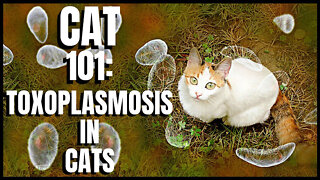Premium Only Content

Myths and truths: toxoplasmosis in cats and pregnant women.
Myths and truths: toxoplasmosis in cats and pregnant women.
Toxoplasmosis is a disease caused by an obligate intracellular protozoan, Toxoplasma gondii. Found in the feces of cats and other felines, it can take up residence in humans and other animals. It is one of the most common zoonoses worldwide.
This analogy is due to the fact that cats and other felids are the only ones that can actually transmit toxoplasma to other species. However, for a cat to contract toxoplasma, it must have access to game meat (rodents or birds), or receive raw meat of unknown origin in its diet. After acquiring the parasite, the agent replicates in the cat's intestine and is eliminated through the feces. This happens only once, over a period of approximately five to seven days. In other words, the transmission is not continuous. The agent eliminated via fecal matter becomes infective in 24 to 46 hours when exposed to room temperature. The contamination of humans occurs through the consumption of water contaminated by feces and poorly cleaned or undercooked food. Therefore, if the cat is fed with food, makes use of the litter box and the cleaning is performed daily, the chance of contamination is practically nil.
Main toxoplasmosis transmission routes: Oral: through eating raw or undercooked meat, meat of unknown origin and contaminated water. Congenital: transmitted from mother to child during pregnancy.
Remember: Contact between humans and cats does not cause the disease. The danger lies in the ingestion of water contaminated by feces, in addition to poorly washed or undercooked food.
The main measures to prevent toxoplasmosis are through health education and keeping cats healthy. Basic information, such as the ones mentioned in the text, prevent and guide the entire population to the necessary care. Below are highlighted some measures that can contribute to the prevention and control of toxoplasmosis: Feed cats with safe food - pet food is a great option because it offers food safety for pets , Microwave cooking of meats is not reliable to kill the protozoan , It is important to freeze meat at an internal temperature of -12º C , Thoroughly sanitize hands after handling raw meats or seafood, It is important to thoroughly sanitize hands after handling raw meat or seafood, as well as washing cutting boards, plates, countertops, and utensils, which is extremely important to avoid cross-contamination between foods. Proper washing includes brushing the food , Consume filtered or boiled water , Clean the water tanks periodically , Do not feed cats raw or undercooked meat , Clean the litter box of pet cats daily and sanitize your hands well after practice. If possible, use disposable gloves to perform the cleaning.
It is worth mentioning that it is very important to keep a close eye on your cat's health, offer quality food, perform periodic exams, and keep the deworming up to date to ensure that the pet and the family will always be healthy.
-
 8:17
8:17
Catspot
3 years ago $0.03 earnedToxoplasmosis in cats
104 -
 1:06
1:06
WXYZ
3 years agoCOVID vaccines and pregnant women
3594 -
 5:56
5:56
The Officer Tatum
3 years agoWomen GET PREGNANT BY TRANS WOMEN in all female prison
2.39K41 -
 3:08:21
3:08:21
JakRazGaming
6 hours agoPlaying Ghost of Tsushima DIRECTOR'S CUT!! on PS5 Stream 6
27.2K2 -
 29:06
29:06
Scary Mysteries
1 day agoThe Corpsewood Manor Murders: Satan, Secrets, and a Savage End
22.4K13 -
 2:08:56
2:08:56
Lara Logan
1 day agoUNHOLY EXPERIMENTS: Justin Goodman Exposes the Evil of Animal Torture | Ep 28
21.8K32 -
 LIVE
LIVE
The Sufari Hub
4 hours ago🔴SUFARI AUGUST SHOWCASE 🔴W CONTENT 🔴 10 SUBS? 🔴WHAT SHALL WE DO THIS COMING MONTH?
16 watching -
 3:08:40
3:08:40
CHiLi XDD
5 hours agoSTREET FIGHTER 6 - Rise and Grind to Master!
6.64K -
 36:27
36:27
Degenerate Plays
1 day ago $0.51 earnedStatic Shock Actually Changed My Life - Batman: Arkham Asylum : Part 10
9.18K -
 6:32
6:32
Members Club
1 day ago $0.65 earnedWNBA Players Demand Pay—Then Get Petty With Caitlin Clark
7.57K7